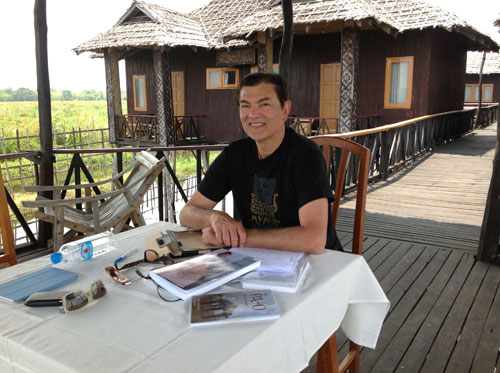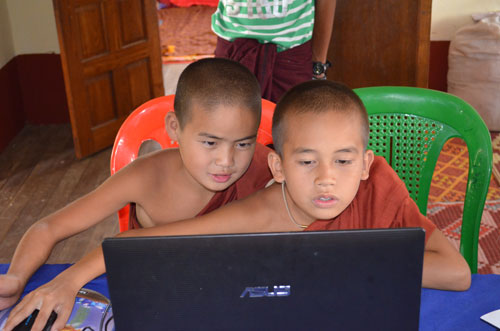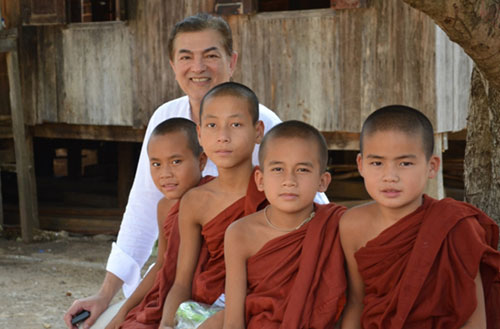|
|
The South
Asian Life & Times - SALT |
|
|||
|
Contents Wildlife
& Adventure
Feature Environment Lifestyle Feature Chef Manish
Chef Vivek Singh Chef Vikram Sunderam
People
Health
Book Reviews In Memoriam
|
|
||||
|
Q
& A with Feroze Dada
Feroze Dada is a qualified chartered accountant and chartered tax
advisor. He is currently chairman of Crowe Clarke Whitehill office in
Mayfair, London. He is also a non-executive director of several private
companies. Outside his professional life, Feroze is passionate about cricket
and music. He currently performs in his own band, the Tax Pistols. 'Children
of Revolution' is his first book. It is at once a travelogue and a sensitive
and compelling tale of people of Myanmar and the challenges in their daily
lives.
Feroze Dada was born in Karachi. He has lived and worked for most of his
life in London.
I understand that your book and the charitable work being carried out at
this monastery also have the written endorsement of His Holiness The Dalai
Lama?
So most evenings and going late in the night I spent time in dialogue with
the Monk in discovering how he taught these children to become such fine
human beings. The more I talked to the Monk the more apparent it became that
there were deeper layers. To understand the Monk I had to now understand his
teacher ………Buddha.
And so to answer your question: I was fortunate not just to read about
Buddhism but I saw it in action in the way these children were taught and
what they became – and in this way my own journey of discovery was complete.
As the great Spanish philosopher, Maimonides once said ”You must accept the
truth from whatever source it comes.” When you are touched by the truth
unfolding in front of you, surely there will be a spiritual change.
Difficult for me to judge myself. But on a lighter note MuMu (my wife) often
says when I get out of line “Did the Monk not teach you anything!”
Much of my time in Burma has been spent in the remote areas at Inle Lake and
mainly on work at or for the monastery where I feel Buddhism is apparent in
everyday life. Even in Yangon (working on this project) people are mostly
charitable and kind hearted and always helpful. In fact I was reading a
report recently by The Charities Aid Foundation in London which ranked Burma
as the most Charitable nation.
There is no doubt that moral values are being tested in Burma’s surge
towards democracy and capitalism.
When after a week or so of teaching the children about computers the course
ended; and I quote from my book:
Phongyi thanked us before asking me to address the students. I wasn’t
prepared for that…………..I said what I instinctively felt:
A human being learns all the time and that the old do not always teach the
young. The students had learnt some computer skills from us. But we had
learnt a lot more from them. We had seen them behave with humility,
kindness, generosity and with the utmost dignity at all times. We should
aspire to live by their example.
The monastery is still very remote and it is only very recent that because
of the good schooling by the Monks the children are able to get jobs in the
nearby towns. London is still a bridge too far.
Yes. There are currently about 1000 orphaned, abandoned or very poor
children boarding at the monastery and all the facilities are overstretched,
to say the least. There is no medical facility at the monastery or nearby.
So we are looking at building a medical
centre
so that some emergency care is available at hand for the children. There is
also a need for better toilet facilities –currently the children often use
the lake or forest for this purpose.
I left the Monastery on 20th August –a momentous day-the day the water
started flowing from the Ko Yin Mineral Water Factory. I heard only
yesterday that there are queues of people lining up to buy the water
bottles- why shouldn’t they: It is the very best quality purified mineral
water from a mountain spring and blessed by the Monks!
And the label on the bottle says:
One bottle feeds one child one meal. One day it will become a world
best-seller.
Once they realised that I was not going through a “three quarter life
crises” I was overwhelmed by support.
I would like to share my life lesson:
When worldly knowledge is harnessed with good intent for moral ends, it can
bring maximum benefit and incredible happiness- try it and see!
Donations to the monastery can be made online via:
www.inletrust.org.uk
|
|||||
|
Copyright © 2000 - 2015 [the-south-asian.com]. Intellectual Property. All rights reserved. |
|||||


